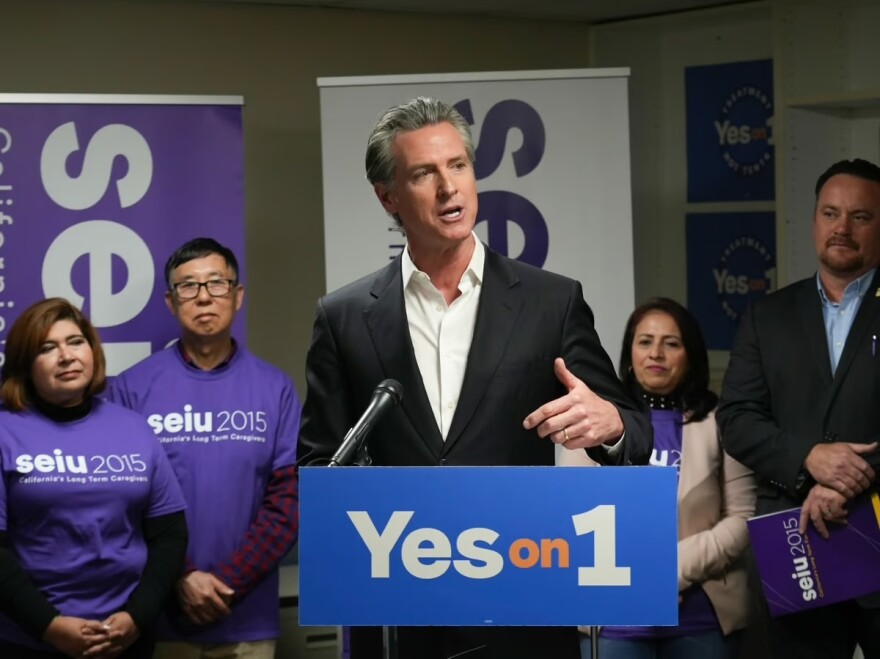The measure needs a simple majority vote to pass. It was too early to call Wednesday morning, and it could take days before the final results are tallied.
The proposition would do two things, if approved:
- Approve a $6.38 billion bond to build thousands more units of permanent supportive housing and treatment beds for people with mental illness and/or substance use disorder across the state.
- Change the terms of the , a law passed by voters in 2004 that uses a 1% tax on high earners (those with incomes over $1 million per year) to help pay for mental health services. More money would be spent on housing and support services for people with mental illness and substance use disorder, and less would be spent on existing county services like outpatient treatment and crisis response.
Newsom spent significant time and money campaigning on the measure's behalf, raising more than $13 million to promote it with the support of law enforcement, first responders, hospitals and mayors of major cities. Opponents raised just $1,000. He did not make any statements Tuesday as votes were counted.
“The status quo is not acceptable,” Newsom said Monday at a final campaign stop.
The Democratic governor says the proposition is needed to address the by boosting investments in housing and substance use programs, but social providers worry it would that are keeping people from becoming homeless in the first place.
"Prop. 1 was a monumental mistake, from its conception to its campaign," a Wednesday statement from Paul Simmons, a , reads. "Gov. Newsom may now face one of his worst public defeats ever, failing at time when he's been auditioning for a greater role nationally."
Sacramento Mayor Darrell Steinberg authored the original Mental Health Services Act in 2004, and has been an advocate for modernizing the law. Speaking with , he said he hoped Proposition 1 would pass: "I'm hopeful that the votes are going to move in a positive direction, and it's up now, it's not down, and that we're going to win. I think this initiative is essential to focusing the money on where the need is the greatest."
He said he thought the race was tight because of the low turnout, and hesitation about a large bond measure during tough financial times. "I still hope it's going to pass and that we will have this change to help get more people off of our streets and respond to a real crisis in California."
Republican Darlene Farnum, a retired salesperson from the Southern California suburban city of Fountain Valley, said Tuesday she voted for the proposition even though it was backed by Newsom, someone she said she disagrees with on just about everything else.
“We need to do something besides letting people die and be homeless,” she said.
Brian Frey, a programmer who lives in Sacramento, also voted for the proposition and said the issue is personal to him.
“My brother is actually homeless. He’s suffering from some mental health issues right now,” Frey said. “I think it’d be good to provide funding for treatment centers.”
The measure would restrict how counties use money from a voter-approved tax enacted in 2004 on millionaires that currently is earmarked for mental health services under broad guidelines. Revenue from the tax, now between $2 billion and $3 billion a year, provides about one-third of the state’s total mental health budget.
Counties would be required to spend about two-thirds of those funds on housing and programs for homeless people with serious mental illnesses or substance abuse problems.
Newsom wants to give the state more control over how that money is spent, but critics say it would apply one formula to all counties regardless of the size of the local homeless population and could pit programs for children against those for homeless people.
Proposition 1 also would authorize the state to borrow $6.38 billion to build 4,350 housing units, half of which would be reserved for veterans, and add 6,800 mental health and addiction treatment beds.
In an effort to ensure accurate, comprehensive tallies, counting ballots in California has become a weekslong drama that, in close contests, can transform Election Day into an election month. Mail ballots postmarked by Tuesday can arrive within seven days and are still valid. The heavy reliance on mail ballots — every voter receives one — also results in an extended tally, since each must be opened, validated and processed.
During the NPR California Newsroom’s primary election special on Tuesday evening, Democratic Strategist Debbie Mesloh said if Newsom wants to seek higher office, he needs to show progress on the homelessness front.
“You can’t see these tent cities in Los Angeles and San Francisco without pointing to some things that you tried to do to move the ball down the field.”
Homelessness has become one of the most frustrating issues in California. The state accounts for nearly a third of the homeless population in the United States; roughly 181,000 Californians are in need of housing. The state, with a current inventory of 5,500 beds, needs some 8,000 more units to treat mental health and addiction issues.
Newsom’s administration already has spent at least $22 billion on various programs to address the crisis, including $3.5 billion to . California is also giving out $2 billion in grants to build more treatment facilities.
The proposition is touted as the final piece in Newsom's plan to reform California’s mental health system. He has already pushed for laws that with behavioral health issues into treatment.
Trân Nguyễn of The Associated Press contributed to this report.
Copyright 2024 CapRadio


